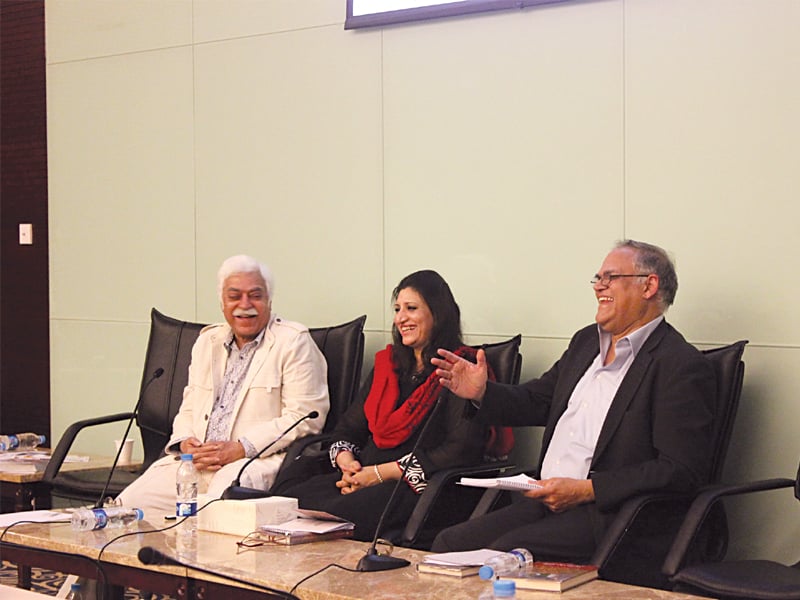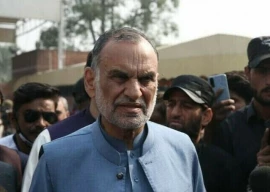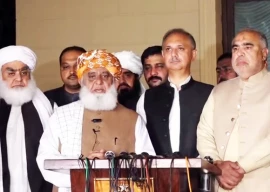
Jabbar was speaking on Sunday during a reading session of his book “Pakistan: Anokhi Tashkeel, Anokhi Tadbeer” on the second day of the National Book Day celebrations.
The three-day festival, organised by the National Book Foundation and held at the Pak-China Friendship Centre, culminates on Monday.
“We still have two nations in the subcontinent if religion is considered to be one of the criteria for defining a nation. The two-nation theory is still alive and should not be allowed to be hijacked by obscurantists,” said Jabbar.
Jabbar said many Op-Ed columnists wanted people to believe that the two-nation theory ended with the creation of Bangladesh, something he could not agree with.
“I’ve tried to prove in my book that in 1971, Bangladeshis rejected the state of Pakistan, not the concept of a Muslim nation. They are still proud and committed Muslims,” he said.
Discussing the book’s contents, International Islamic University Islamabad’s (IIUI) Politics and International Relations Department Chairperson Dr Noor Fatima said Jabbar had used an optimistic tone to identify the factors which make Pakistan’s origins and its current reality unique.
Jabbar mentioned that Pakistan was the first Muslim country to have reserved seats for women in legislative assemblies and to produce a Nobel Peace Prize winner, said Fatima.
She said the book did not ignore Pakistan’s low Human Development Index ranking or governance issues.
Critic and educationist Fateh Muhammad Malik raised questions about some of the book’s claims, but appreciated Jabbar’s initiative.
“I think you have shown the courage to write about the problems facing Pakistan, some of which bear huge significance to the country’s future,” Malik said.
During another session, Farrukh Jameel paid homage to his late father Mansha Yaad by reading out one of his short stories, “Raastay band hain.”
In the story, Yaad addresses social disparity issues, unfulfilled desires, deprivation and individual and collective sorrows through an emotional tussle between two characters, one of whom is penniless but has a desire to taste different food items at a carnival.
The second character, who is the narrator of the story, instructs his companion to picture what he yearns for instead of feeling bad about not being able to afford anything. But the experiment takes a turn for the worst when the character imagines the pain of a motorcyclist getting crushed by a truck, and dies.
Tahira Ghauri, a discussant at the session, said the story exemplified the pain and sorrow in a class society in which some segments are privileged while others are almost always striving to make ends meet.
Published in The Express Tribune, April 22nd, 2013.
COMMENTS (1)
Comments are moderated and generally will be posted if they are on-topic and not abusive.
For more information, please see our Comments FAQ
1730793476-0/bella-(1)1730793476-0-405x300.webp)

1723119450-0/jlo-ben-(6)1723119450-0-165x106.webp)

1730270970-0/BeFunky-collage-(84)1730270970-0-165x106.webp)



1730786905-0/£300,000-(1)1730786905-0.png)






1730706072-0/Copy-of-Untitled-(2)1730706072-0-270x192.webp)
Such functions,to promote both Urdu & English literature, should not only be organized in major cities,but all over Pakistan to create interest in public for reading & writing.There used to be regular features in some of the cities such as Karachi,Lahore, Rawalpindi & Islamabad. However,with the passage of time,generally, people lost that visible interest, perhaps,because of some social compulsions & constant diminishing urge for acquiring education coupled with apathy of successive political dispensations in providing facilities to educate public.But,under the circumstances,it is hardly possible to divert the focused attention of people from Roti,Kapra aur Makan which remain the bye products of crushing unemployment & abject poverty factor. One day......One day the multitude of deprived people will achieve their desired objectives!!